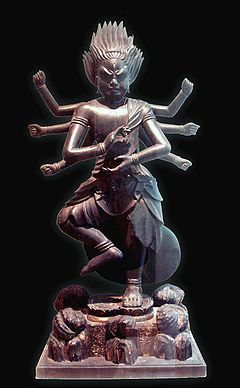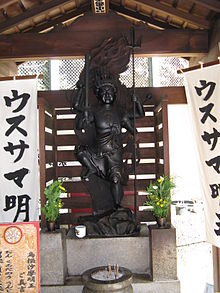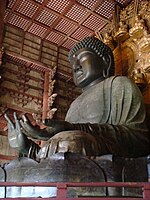| Ucchuṣma | |
|---|---|
 The Wisdom King Ucchuṣma. The Wisdom King Ucchuṣma. | |
| Sanskrit | उच्छुष्म (IAST: Ucchuṣma) |
| Chinese | 烏樞沙摩 (Pinyin: Wūshūshāmó) 穢跡金剛 (Pinyin: Huìjì Jīngāng) 火頭金剛 (Pinyin: Huǒtóu Jīngāng), etc. |
| Japanese | 烏枢沙摩明王, 烏芻沙摩明王, etc. (romaji: Ususama Myō'ō, Usushama Myō'ō, etc.) 穢跡金剛 (romaji: Eshaku Kongō) 火頭金剛 (romaji: Katō Kongō), etc. |
| Korean | 오추사마명왕 (RR: Ochusama Myeongwang) 예적금강 (RR: Yejeok Geumgang) 화두금강 (RR: Hwadu Geumgang), etc. |
| Tibetan | Wylie: Khro bo sMe brtzegs mNol ba med pa sMe ba brtsegs pa |
| Vietnamese | Ô Xu Sa Ma Minh Vương Uế Tích Kim Cương, etc. |
| Information | |
| Venerated by | Mahayana, Vajrayana |
| Attributes | Destroyer of defilements Toilet god |

Ucchuṣma (Chinese: 穢跡金剛; pinyin: Huìjì Jīngāng; Rōmaji: Eshaku Kongō) is a Vidyārāja in Mahayana and Vajrayana Buddhism.
Ucchuṣma's full name in Sanskrit sources is Vajra Krodha Mahābala Ucchuṣma (lit. "Great Strength Furious Diamond Ucchuṣma"). In Chinese, this is translated as 大力威怒金刚烏芻使摩 (pinyin: Dàlì Wēinù Jīngāng Wūchúshǐmó), from the Chinese version of the Sūtra of Mahābala and the Tibetan version of the Ārya-Mahābalanāma Mahāyāna Sūtra.
Name
Ucchuṣma is known by various epithets and names in Chinese and Japanese Buddhism, which developed due to controversy surrounding the negative associations with impurities surrounding some of his names.
Epithets
The Vajra-being of Impure Traces
- Traditional Chinese characters: 穢跡金剛
- Simplified Chinese characters: 秽迹金刚
- Pinyin: Huìjì Jīngāng
- Rōmaji: Eshakukongō
The Vajra-being who Removes Impurities
- Traditional Chinese characters: 除穢金剛
- Simplified Chinese characters: 除秽金刚
- Pinyin: Chúhuì Jīngāng
The Vajra-being of Secret Traces
- Traditional Chinese characters: 密跡金剛
- Simplified Chinese characters: 密迹金刚
- Pinyin: Mìjī jīngāng
- Rōmaji: Misshaku Kongō
The Vajra-being of Fire Head
- Traditional Chinese characters: 火首金剛
- Simplified Chinese characters: 火首金刚
- Pinyin: Huǒshǒu jīngāng
- Rōmaji: Kashu Kongō
The Vajra-being of Contact
- Traditional Chinese characters: 受触金剛
- Simplified Chinese characters: 受触金刚
- Pinyin: Shòuchù jīngāng
- Rōmaji: Jusoku Kongo
Transliterations
Ucchuṣma Vidyārāja (Transliteration 1)
- Traditional Chinese characters: 烏枢沙摩明王
- Simplified Chinese characters: 乌枢沙摩明王
- Pinyin: Wūshūshāmó Míngwáng
- Rōmaji: Ususama Myōō
Ucchuṣma Vidyārāja (Transliteration 2)
- Traditional Chinese characters: 烏枢瑟摩明王
- Simplified Chinese characters: 乌枢瑟摩明王
- Pinyin: Wūshūsèmó Míngwáng
- Rōmaji: Ususama Myōō
Ucchuṣma Vidyārāja (Transliteration 3)
- Traditional Chinese characters: 烏瑟沙摩明王
- Simplified Chinese characters: 乌瑟沙摩明王
- Pinyin: Wūsèshāmó Míngwáng
- Rōmaji: Ususama Myōō
Ucchuṣma Vidyārāja (Transliteration 4)
- Traditional Chinese characters: 烏芻沙摩明王
- Simplified Chinese characters: 乌刍沙摩明王
- Pinyin: Wūchúshāmó Míngwáng
- Rōmaji: Uzusama Myōō
Śūraṅgama Sūtra
According to the Śūraṅgama Sūtra, Shakyamuni Buddha asked the bodhisattvas and arhats to present their methods of understanding the ultimate truth. The eighteenth person to present his character was Ucchuṣma. The Sūtra states:
- Ucchuṣma came before the Buddha, put his palms together, bowed at the Buddha’s feet, and said to the Buddha, "I can still remember how many kalpas ago I was filled with excessive greed and desire. There was a Buddha in the world named King of Emptiness. He said that people with too much desire turn into a raging mass of fire. He taught me to contemplate the coolness and warmth throughout my entire body.
- A spiritual light coalesced inside and transformed my thoughts of excessive lust into the fire of wisdom. After that, when any of the Buddhas summoned me, they used the name 'fire-head.'
- From the strength of the fire-light samādhi, I accomplished Arhatship. I made a great vow that when each of the Buddhas accomplishes the way, I will be a powerful knight and in person subdue the demons' hatred.
- The Buddha asks about perfect penetration. I used attentive contemplation of the effects of heat in my body and mind, until it became unobstructed and penetrating and all my outflows were consumed. I produced a blazing brilliance and ascended to enlightenment. This is the foremost method."
Ucchuṣma Vajrapāla Sūtra
The Ucchuṣma Vajrapāla Sūtra asserts that Ucchuṣma is actually the Vajra manifestation of Shakyamuni Buddha. Legend has it that when Shakyamuni Buddha was about to enter into Nirvana, all heavenly beings, with the exception of the ‘Spiral Hair-knot Brahma King’, came to pay their respect to Buddha. The Brahma King was in fact enjoying himself with the heavenly maidens in his own celestial palace. The heavenly gods, being unhappy with the arrogance of the Brahma King, went to his abode and try to persuade him to attend the Dharma assembly. Upon reaching his palace however, the gods found themselves trapped in the defiled energy cast by the supernatural powers of the king. Even some of the Vajra Deities (金剛神) who were later sent to apprehend the Brahma King were imprisoned by the foul forces as well.
When Shakyamuni Buddha came to learn of this, He employed His Original Wisdom (本智), and the Light of Perpetual Joy and Pliancy was emitted from His heart. Ucchuṣma Vajrapāla (穢跡金剛) soon appeared from amidst the revolving radiance of the Buddha’s heart, and ascended to the celestial palace of the Brahma King. Despite the defiled energy hurled at Him by the Brahma King, Ucchuṣma was unharmed as he immediately turned these forces of contamination into ordinary soil. In no time, the Brahma King was subdued and brought to the feet of Shakyamuni Buddha. For this reason, Ucchuṣma is also known as the "Filth-Eliminating Vajrapāla" (不淨金剛).
Mantras
According to the Ucchuṣma Vidyārāja Dhāraṇi, the mantra provided should be recited forty thousand times by any good man or good woman who is besieged with ailments inflicted by evil spirits. On the tenth day of purification, it should be recited one thousand eight times resulting in the removal of myriad afflictions. The mantra is as follows:
- Oṃ vajra-krodha mahābala hana daha paca mātha vi-kiraṇa vidhavaṃsaya ucchuṣma-krodha huṃ huṃ huṃ phaṭ phaṭ phaṭ svāhā
The short dhāraṇi of Ucchuṣma Vajrapāla:
- Oṃ krodhana hūṃ jaḥ
Mantras for other purposes:
- Oṃ śūri śūri mahā-śūri śūśūri svāhā (Purification of speech)
- Oṃ śutāri śutāri śumari śumari svāhā (Purification of action)
- Oṃ śrimali mamali mali śuśri svāhā (Removal of filth)
Veneration
China
In China, Ucchuṣma is mainly venerated by the Chan tradition who mainly venerates him for his role in the Śūraṅgama Sūtra. He has also penetrated into the traditions of the other schools of Buddhism, such as Tiantai, Huayan and Pure Land Buddhism, as well as Taoism and popular religion. Known in particular as a scatological, obstetrical, and talismanic god, Ucchuṣma has often been invoked in therapeutic, exorcistic, birth and āveśa, or spirit possession, rituals in imperial China. Starting from the late Tang period, he gradually increased in popularity outside of his marginal position in maṇḍalas, eventually thriving as an independent protector deity with his own cult. He is seen as a manifestation of Shakyamuni Buddha. His statue can be found in certain temples, usually enshrined in the Mahavira Hall.
In the Fujian region of Mainland China as well as Taiwan, Ucchusma is also one of the deities who are regularly invoked by Buddhist adepts and Taoist ritual masters in various ritualistic ceremonies, including rites of exorcism. The tradition of performing these rituals, as well as the liturgical works on which the rituals are based on, have a history dating back to at least the early Ming period.
In addition, Ucchusma is sometimes paired or identified with Guhyapāda, who is commonly known in Chinese as Mìjī Jīngāng (密跡金剛). In a thirteenth-century Chinese long gāthā elaborating on the two major scriptures relating to Ucchusama, the Huiji Jin’gang Shuo Shentong Daman Tuoluoni Fashu Lingyao Men (穢跡金剛說神通大滿陀羅尼法術靈要 門經; lit "The Scripture of the Numinous and Essential Gate to the Ritual Techniques of the Great Perfection Dhāraṇī of Supernatural Power as Spoken by the Vajra-being of Impure Traces"; T. 1228), and the Huiji Jin’gang Jin Baibian Fajing (穢跡金剛禁百變法經; "The Scripture of the Rites of the Vajra-being of Impure Traces for Binding the Hundred Transformations"; T. 1229), Ucchuṣma’s Chinese name Huìjì Jīngāng was changed to Mìjī Jīngāng due to negative connotations associated with the former name. In the Chongbian Zhutian Zhuan (重編諸天傳; lit "Recompiled Biographies of Devas and Devīs") from the Southern Song period, one of the Sanskrit transliterations given for Guhyapāda is Ucchuṣma. In a repentance ritual for the Śūraṅgama Sūtra, both Guhyapāda and Ucchusama were invoked as a pair. The two wrathful deities were also sometimes found standing opposite each other at the entrances of some monasteries.
Japan
In Japan, Ucchuṣma is venerated in several schools of Buddhism, including Tendai, Shingon, Zen and Nichiren. He is recognized as a guardian of the bathroom, where his effigy is often present. He is known to the general public for his powers of purification of the unclean, in particular in respect to sexual diseases.
Ucchuṣma was also thought to be able to change a female fetus into a male one.
Temples
A non-exhaustive list of temples that enshrine Ucchuṣma are as follows, arranged according to tradition:
Shingon
Tendai
- Tōkō-ji (Tokyo)
- Kannonshō-ji (Shiga)
Sōtō Zen
- Kaiun-ji (Tokyo)
- Zuiryū-ji (Toyama)
- Akiba Sōhonden Kasuisai (Shizuoka)
- Myōtoku-ji (Shizuoka}
- Daikō-in (Aichi)
Jōdo-shū
- Tairyū-ji (Tokyo)
Nichiren
See also
Notes
- The Surangama Sutra with Commentary - Volume 5 - Explained by Venerable Master Hsuan Hua p.94
- Ucchusma Vajrapala Sutra
- "秽迹金刚说神通大圆满陀罗尼梵音". Youtube. 馬來西亞萬撓佛教會 Rawang Buddhist Association, Selangor, Malaysia. 30 April 2011. Archived from the original on 2021-12-21. Retrieved 2019-06-25.
- "常見經本真言集" (PDF). wisdombox.com. Retrieved 2019-06-25.
- Zhaohua., Yang (2013). Devouring impurities : myth, ritual and talisman in the cult of Ucchusma in Tang China. OCLC 848167476.
- Flanigan, Stephen McIver (2019). Sacred Songs of the Central Altar: Texts and Histories of the Ritual Master in the Religious World of Southern Taiwan (Thesis thesis). University of Hawaiʻi at Mānoa. hdl:10125/66194.
- Zhaohua., Yang (2013). Devouring impurities : myth, ritual and talisman in the cult of Ucchusma in Tang China. OCLC 848167476.
- 釋行霆. (2005). 重編諸天傳 : [上下卷]. Xian zhuang shu ju. ISBN 7-80106-234-5. OCLC 828410455.
- Zhang, Shou yue (1573–1722). Lu, Guang zu (ed.). 依楞嚴究竟事懺(二卷) : 2卷. Ke shu zhe bu xiang. OCLC 989511208.
- Bonnefoy, Yves (1993). Asian mythologies. University of Chicago Press. ISBN 0-226-06456-5. OCLC 473747570.
- 林克智 (2000). 祥和洒脫之路. Zong jiao wen hua chu ban she. ISBN 7-80123-262-3. OCLC 57071132.
- Williams, Duncan Ryuken (2005). The other side of Zen : a social history of Sōtō Zen : Buddhism in Tokugawa Japan. Princeton, N.J.: Princeton University Press. ISBN 0691119287. OCLC 54479202.
- Baroni, Helen Josephine (2002). The illustrated encyclopedia of Zen Buddhism (1st ed.). New York: Rosen Pub. Group. ISBN 0823922405. OCLC 42680558.
- McCullough, Helen Craig., ed. (15 March 2004). The Taiheiki : a chronicle of medieval Japan. Rutland, Vt.: Tuttle. ISBN 0804835381. OCLC 86222702.
External links
 Media related to Ucchusma at Wikimedia Commons
Media related to Ucchusma at Wikimedia Commons

